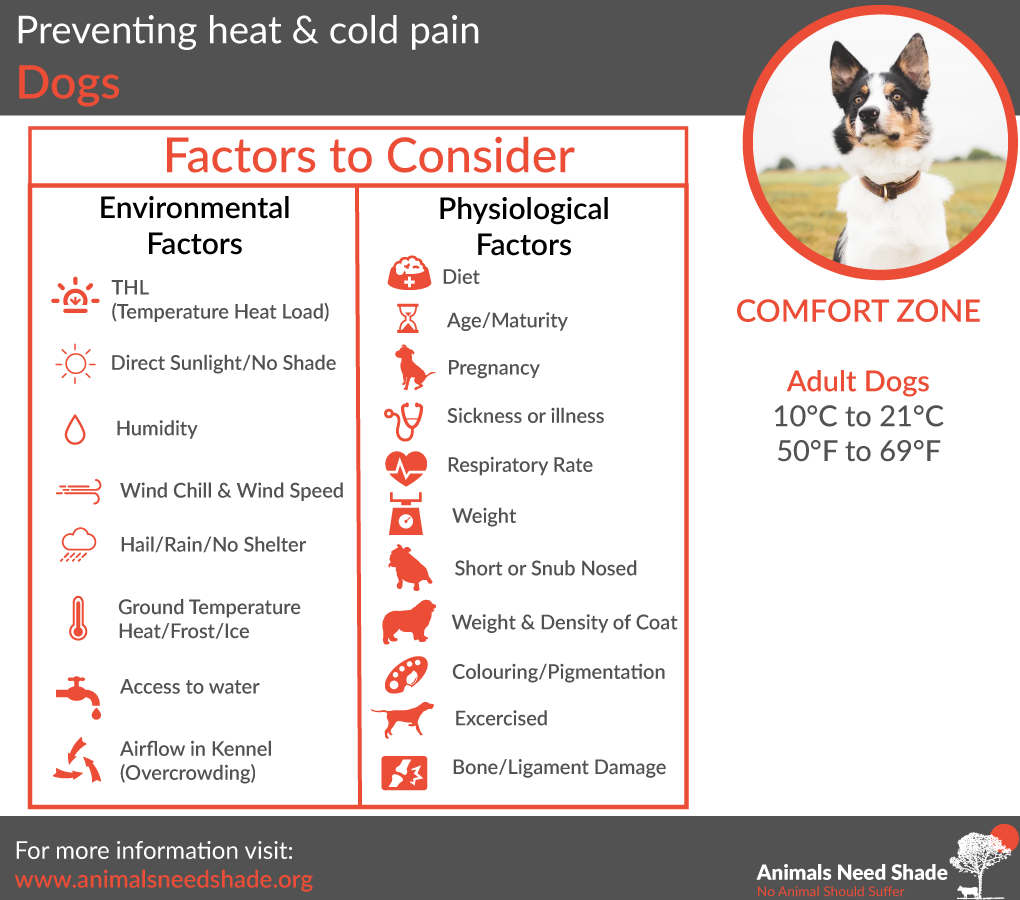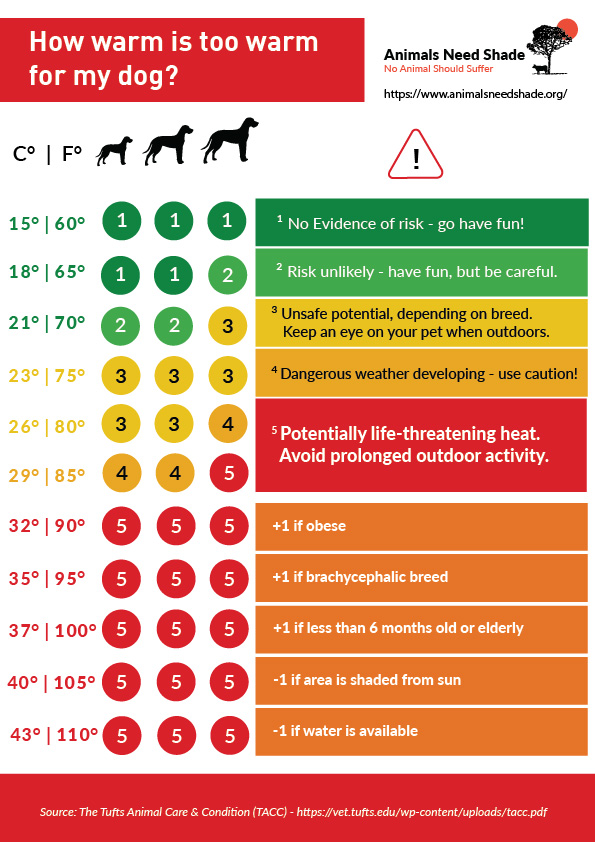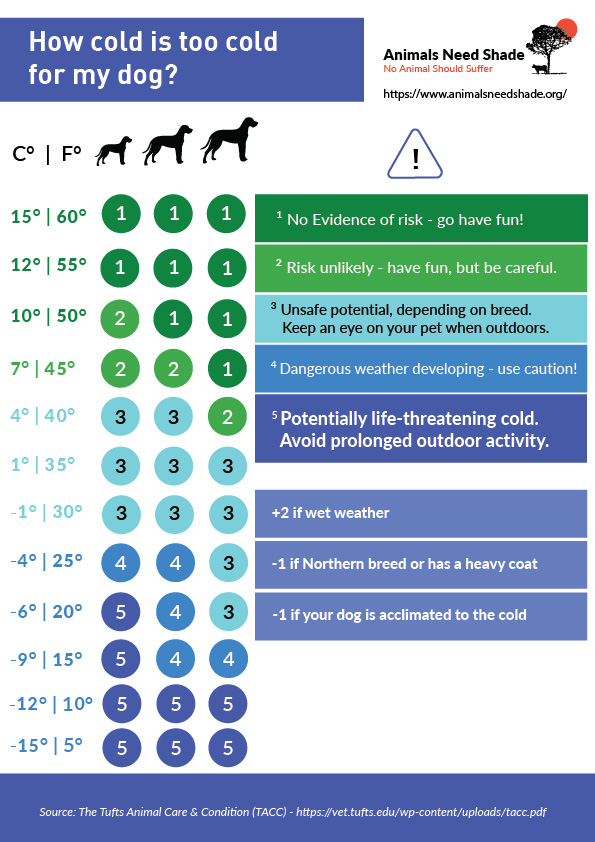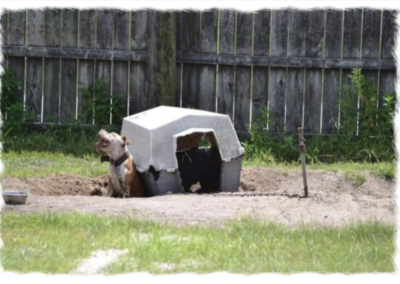Effects on Animals
DogsCruelty and neglect of dogs globally is an animal welfare crisis – Urgent Education & Policy Change is Critical Zone of Comfort 10-20 Degrees Celcius (50-68F). At 23 Degrees (75F) there is Unsafe Potential. At 26 Degrees (80F) Dangerous weather is developing for your dog. Caution particularly if outside.
Unfortunately many owners of dogs don’t even consider that their pets and working dogs are susceptible to issues relating to prolonged exposure outside of their comfort zones to heat & cold.
While heat/cold pain is more common in summer/winter, it can occur at any time throughout the year even when the weather is mild. Dogs have a limited ability to sweat (paws, nose) and pant as a means of cooling their bodies using the evaporation of moisture from the tongue and mouth. This means that dogs overheat very quickly and can suffer heat pain/heat stroke in hot and even warm conditions. Because they’re not able to regulate their temperature as easily as we are, it’s critical that we provide them temperate, sheltered environments with good air flow and uninhibited access to clean water.
Urgent Education is needed to advise dog owners how to avoid needless suffering and to act quickly when they see the warning signs.
Excessive Panting, Drooling/Salivation, pale gums, increased heart rate, diarrhea, vomiting,
How to keep your dog cool and what to do if your dog overheats and suffers heat pain. If your warm – your dog is already feeling hot and you need to take action!
Plenty of Drinking Water must be availabe at all times, Airconditiong/Fan, Place a Wet towel over the dogs body, A cool not cold dog bath/flat bucket of water should be available in warm months to cool the dogs paws or for bathing.
What are the effects of prolonged exposure outside of a dogs comfort zone?
- Organ Failure
- Sudden & Painful Death – Cardiac Arrest
- Compromised Immune System
- Respiratory Disease
- Lethargy & Tiredness
- Loss of bladder control
- Diarrhea
- Fainting
- Seizures, Coma

Heat & Cold reference images for dogs


Tethering or Chaining your dog
Animals Need Shade are joining Humane Animal Welfare groups around the world to educate policy makers and the public about the scientifically proven dangers of unattended chaining/tethering of dogs. The climate crisis has made the need for urgent change critical.
Dogs around the world including Australia can spend days, weeks and sometimes their their whole lives on the end of a rope or chain. Many of these dogs live a life of endless suffering with no adequate protection from the blazing sun, hail, freezing cold -sometimes with no shade shelter at all. Many dogs are dying and yet policy makers continue to sit in air conditioned offices. This cruel practice is now banned in many counties within the United States and other countries, such as Malta, have now banned dog chaining as it has been proven that it is impossible to monitor how long a dog/s are confined on a chain. (https://timesofmalta.com/articles/view/watch-it-is-finally-illegal-to-chain-dogs.690813) Sadly Australia and other countries are still negligent in offering protection to dogs. Dog chaining is detrimental to the physical and mental well-being of any dog. Many chained dogs are deprived of adequate food and water, shelter, and veterinary care, and their social needs are ignored. They frequently die of illnesses related to heat pain/heatstroke, heart attacks and other organ failure in countries around the world battling the high temperatures that have now become commonplace. In winter they succumb to exposure. Internal and external parasites often feed on these animals year round who are more commonly neglected when chained. In the summer, flea and tick infestations and the added suffering brought on by flystrike are especially severe for chained dogs, who have no escape from them.
SAVING PUBLIC MONEY
Many countries do not provide routine inspections after an initial complaint is made (eg, Queensland, Australia). If no one else complains again after an initial complaint the dog will continue to suffer. This poor policy does not protect dogs the way in which public expect. Banning dogs on chains saves public money and the need for routine inspections. Thousands of calls come in every year for dogs suffering on the end of a rope/chain without adequate or no protection at all from blazing sun/hail/rain/wind chill. Come on policy makers we can do better!.
Figure 1. Distribution of dogs by complaint code.- Reference: https://www.mdpi.com/2076-2615/9/5/282/htm
- PD-Poor dog condition (27.9%, N = 29,982)
- IF-Insufficient food and/or water (26.3%, N = 28,265)
- NE-No exercise/confined/tethered (25.9%, N =27,913)
- AB-Abandonment (20.1%, N = 21,626)
- PL-Poor living condition (18.7%, N = 20,162)
- NT-No treatment (17.6%, N = 18,963)
- CR-Cruelty (15.5%, N = 16,661)
- NS-No shelter (12.7%, N = 13,682)
Animals Need Shade are proud to support the movement to Ban Dog Chaining in Australia – For more information please visit http://www.bandogchaining.org
Take Action
How can you help?
Sign a Petition
Join the thousands of voices around the world campaigning for better conditions for animals
Make a Report
Report incidents of animal cruelty or abuse to local authorities or support groups
Write a Letter
Advice on how to write and engage with your local government or representatives
Shade Solutions
Do you have farm animals? Learn how to protect their health with shade
PROHIBIT SHOCK DOG COLLARS
– E-Petition
Already banned in other states
Queensland residents draws to the attention of the House the Animal Care and Protection Act 2001 (the Act) permits the use of electric (shock collars) that cause injury and pain to dogs. These collars deliver regular electric shocks with capacity to increase intensity. They rely on painful punishment and negative reinforcement to control dogs and stop barking. The RSPCA says if the collars stay on for long periods, they can become embedded in a dog’s neck. Electric collars can malfunction, administering no shocks or nonstop shocks. The anxiety and confusion caused can lead to changes in a dog’s heart and respiration rates. The Australian Veterinary Association says the pain and fear generated by electric collars go beyond short-term suffering, creating long-term stress. Dogs can develop anxiety, reduced motivation, increased and redirected aggression. This aggression can be dangerous for the public. The collars are now banned in Denmark, Norway, Sweden, Austria, Switzerland and Germany. The State of New South Wales has banned electric collars. In countries where animal welfare is paramount they are banned as an abusive form of control. RSPCA recommend in its publication Lead by Example, the practice of training dogs using pain and fear should be replaced with positive reinforcement. RSPCA publish a list of collars that do not cause harm to dogs.
Your petitioners, therefore, request the House remove any provisions in the Act that permit the use of an electric collar on a dog and implement legislation to prohibit the use of electric ore-collars.
PROHIBIT UNATTENDED CHAINING OF DOGS
– E-Petition
Already banned in other countries with proof showing positive results for dogs – Less dog bites
Your petitioners, therefore, request the House to amend the provisions of the Act that permit prolonged unsupervised confinement/tethering of a dog. Short duration tethering must only take place when the person in charge is outside with the dog in its sight at all times. Dogs must be confined at all other times within a species-specific fenced yard without tethering, or confinement by chains or ropes attached to a stationary inanimate object The fenced yard must be of a size suitable for the breed and weight of dog to allow it to run in an unrestricted way and allow uninhibited freedom of healthy movement to access shelter, water and food at all times.
Your petitioners, therefore, request the House remove any provisions in the Act that permit the use of an electric collar on a dog and implement legislation to prohibit the use of electric ore-collars.
PROHIBIT THE USE OF CHOKE COLLARS USED ON DOGS
– E-Petition
evidence shows negative training based on pain and punishment
Queensland residents draws to the attention of the House that current legislation permits the use of choke (slip) collars. Choke collars can cause serious injury and pain to dogs. Choke collars are placed to tighten around a dog’s neck to cause rapid constriction and to choke the dog, especially when pulling on a lead. Choke collars are considered to be an abusive form of control based on pain and fear and cause dogs to become distressed, anxious and aggressive. The use of choke collars has been directly linked to whiplash, fainting, spinal cord injuries leading to paralysis, crushing of the trachea with partial or complete asphyxiation, crushing and/or fracture of bones in the larynx, dislocated neck bones, bruising of the oesophagus, bruising and damage to the skin and tissues in the neck, brain damage and prolapsed eyes caused by sharp increases in pressure in the head, tracheal and esophageal damage, Severely sprained necks, transient foreleg paralysis, laryngeal nerve paralysis, hind leg ataxia.
The use of choke collars is not supported by the RSPCA and recognised dog training and welfare organisations. Research shows that choke collars suppress behaviour but does not change behaviour, and leads to emotional and behavioural issues which can lead to aggression.
Your petitioners, therefore, request the House to follow lead where choke collars are already banned, and ban the use of choke collars. All choke collars must be surrendered. Penalties must be introduced for their importation sale and use in Queensland.




